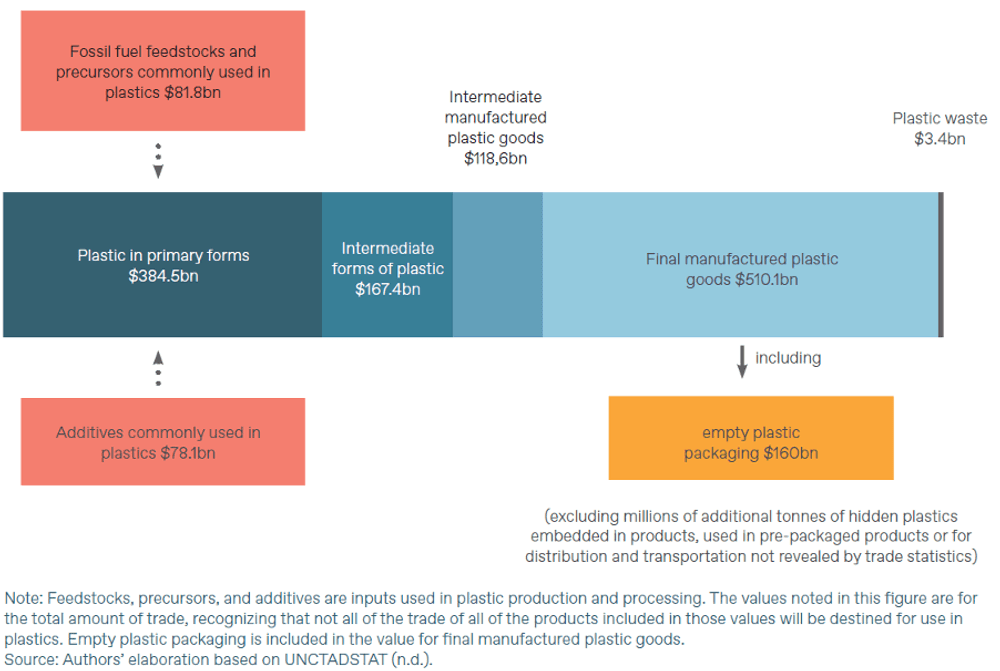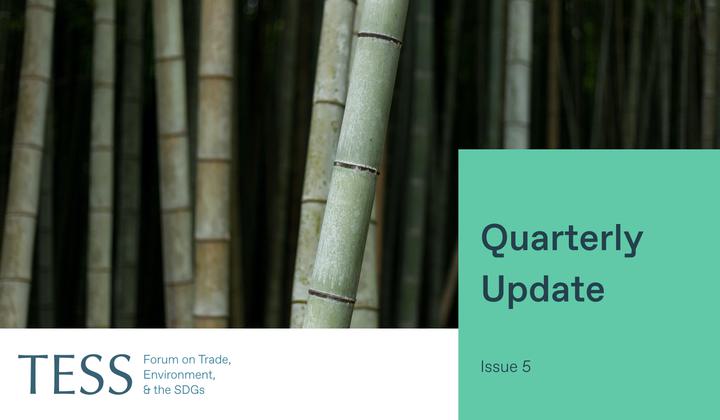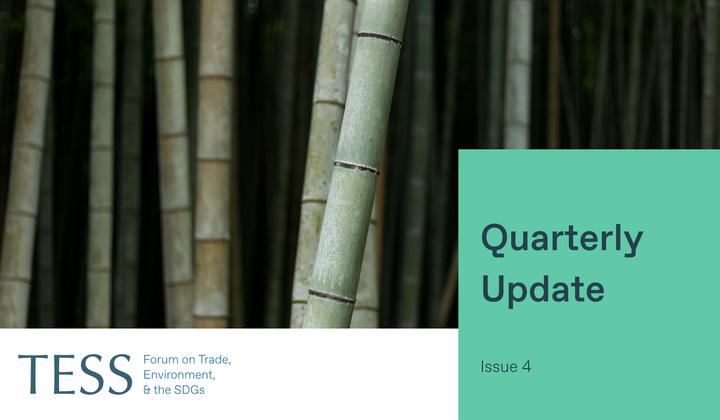Welcome to the sixth edition of the TESS Quarterly Update. The past quarter has continued to see growing engagement by governments and stakeholders on issues of trade, environment, and sustainable development at the multilateral level, with significant work ahead in the lead-up to major international gatherings, including the 2023 SDG Summit (September), the 2023 United Nations Climate Change Conference (COP28) (December), and the 13th WTO Ministerial Conference (MC13) (February 2024).
The WTO Committee on Trade and Environment (CTE) saw encouraging signs of renewed vitality, with a series of submissions tabled by the African Group, China, Colombia, the European Union, India, and the United Kingdom and many members expressing interest to hold thematic discussions. Alongside, the fourth edition of Trade and Environment Week, organized by the WTO in mid-June, featured 18 sessions convened by different WTO members and partners. A video recording of the sessions, including a session on trade-related climate measures hosted by Colombia in cooperation with TESS, is available here.
With just six months to MC13 in Abu Dhabi, WTO members are intensifying work to secure meaningful outcomes on a range of topics. On the sustainability front, over the past quarter, the WTO held the third, fourth, and fifth of a series of “Fish Weeks” where members presented proposals for the second wave of fisheries subsidies negotiations, with a view to agreeing on more comprehensive disciplines at MC13 as stipulated in the WTO Agreement on Fisheries Subsidies adopted at MC12. Meanwhile, large fishing nations including the European Union, Nigeria, China, Japan, and Peru have become the latest WTO members to deposit their instruments of acceptance, meaning 14 members have formally accepted the agreement. Two-thirds of WTO members must formally accept the protocol of the agreement for it to come into force.
Over the past quarter, the respective co-sponsors of the Trade and Environmental Sustainability Structured Discussions (TESSD) initiative; the WTO Dialogue on Plastics Pollution; and the Fossil Fuel Subsidy Reform initiative each discussed the road to MC13 and potential outcomes or progress to report.
Meanwhile, the WTO has published a draft programme for their Public Forum 2023 which will take place on 12–15 September. Under the theme It is time for action, the forum will host an array of events on trade and sustainability bringing a diverse range of perspectives and issues from around the world. TESS staff will be joining a number of sessions as speakers and co-hosts. Alongside the WTO Public Forum, TESS collaborates each year with Geneva Trade Week, hosted by the Geneva Trade Platform. We look forward to hosting a reception of trade and sustainability colleagues in town for the WTO Public Forum as well as a breakfast bringing together climate and trade experts from around the world, and the high-level opening plenary of Geneva Trade Week on pathways forward for international cooperation on trade, environment, and the Sustainable Development Goals (SDGs).

Photo © WTO
Beyond the WTO, key multilateral and related processes relevant to international cooperation on trade and sustainability are on our radar.
On 10–19 July, the High-level Political Forum on Sustainable Development (HLPF)—the international process for follow up and review of the 2030 Agenda—was held in New York. The July HLPF supported the mid-term review of the implementation of the SDGs and preparations for the SDG Summit 2023 to be convened under the auspices of the General Assembly in September. On the agenda were key issues and priorities relevant to the multilateral trade agenda, including affordable and clean energy (SDG 7), industry, innovation, and infrastructure (SDG 9), and global partnerships (SDG 17). The summit marked the mid-point of the implementation of the 2030 Agenda, with progress off track on all 17 SDGs and only 12% of the 140 assessed targets on course to meet the 2030 deadline. During the meeting, delegates heard that the SDG Summit 2023 might be the final opportunity to provoke the accelerated action and collaboration necessary to realize the shared blueprint for sustainable development agreed in 2015.
On 25–28 July, with extreme weather events sweeping across the planet to devastating effect and the world experiencing a series of climate records, the Intergovernmental Panel on Climate Change (IPCC) met in Nairobi, Kenya to elect a new Bureau and lay the foundation for its seventh assessment cycle, expected to conclude around 2030. The UN body elected Jim Skea, United Kingdom, as its new chair. The IPCC’s Sixth Assessment Report, which was accepted in March 2023, feeds into the Paris Agreement’s first Global Stocktake, due to conclude at COP28 in Dubai, United Arab Emirates from 30 November to 12 December. For the first time, trade will have a higher profile at a UN Climate Change Conference, with the host state and UNFCCC holding the first ever thematic day on trade. The WTO, UNCTAD, and other global organizations including the World Economic Forum and International Chamber of Commerce have been invited to help shape the day’s discussions on the role of trade in climate action. TESS looks forward to working with a number of partners on events in support of inclusive international cooperation on climate, trade and sustainable development at COP28. Meanwhile, we will also support discussions on inclusive international cooperation on trade to coincide with the UN Climate Ambition Summit 2023 in September. Stay tuned for more.
On 3–7 July, the International Maritime Organization focused on the challenge of decarbonizing shipping, adopting a revised greenhouse gas (GHG) strategy. The 2023 IMO Strategy on Reduction of GHG Emissions From Ships aims to reach net-zero GHG emissions “by or around” 2050 and includes a commitment by member states to ensure an uptake of alternative zero and near-zero GHG fuels by 2030, as well as indicative check-points for 2030 and 2040. International shipping, which is responsible for transporting 90% of world commerce, accounts for 3% of GHG worldwide emissions.

Photo © IISD Earth Negotiations Bulletin
In the area of trade, finance, and sustainability, the past quarter also saw notable developments. The Summit for a New Global Financing Pact was held in Paris, France on 22–23 June, aiming to inject more efficiency and inclusiveness into the international financial system to fight poverty, finance the transition towards a net zero and biodiversity positive world, and achieve the SDGs. The chair’s summary of discussions highlighted that the public and private actors gathered at the summit “affirmed their collective determination to address the joint climate, nature and development challenges through increased global cooperation,” but there was also frustration that the summit did not yield the range of specific new commitments that a number of actors had hoped for.
The Paris summit built on the Bridgetown Initiative, a call issued in September 2022 for reform of the global financial architecture in response to the urgent action required to channel financial resources towards solving an unprecedented combination of cost of living, debt, and climate crises, including to address the immediate needs of countries facing debt and liquidity challenges. This has since been followed by the Bridgetown Initiative 2.0, released in April 2023, which highlights six key action areas to build a more equitable and effective development finance architecture that supports all developing countries. Of note, action area six is designed to “create an international trade system that supports global green and just transformations.”
On 19–28 June, UNCTAD held the 70th session of the Trade and Development Board, which acts as the organizations’ governing body in-between the quadrennial conferences. The high-level segment of this year’s session focused on decarbonization opportunities and challenges in the blue economy. In July, UNCTAD released its flagship World Investment Report 2023, which this year is dedicated to investing in sustainable energy. The report estimates that developing countries need renewable energy investments of about $1.7 trillion annually but attracted only $544 billion in 2022. The report also estimates that there is a $4 trillion annual investment gap across all sectors of the SDGs.
At the 64th meeting of the Global Environment Facility (GEF) Council held on 26–29 June in Brasília, members adopted a work programme, totalling $1.4 billion, to advance implementation of negotiated outcomes under a range of multilateral environmental agreements. The GEF Council also agreed to establish the Global Biodiversity Framework (GBF) Fund to support the implementation of the Kunming-Montreal Global Biodiversity Framework.
From 29 May to 2 June, the second session of the Intergovernmental Negotiating Committee to develop an international legally binding instrument on plastic pollution, including in the marine environment (INC-2), took place in Paris. INC-2 concluded by mandating the INC Chair to prepare a “zero draft” of the new treaty for consideration at INC-3 in Nairobi, Kenya, scheduled to take place on 11–19 November 2023. In the lead up and during INC-2, TESS supported the work of the High Ambition Coalition to End Plastic Pollution (see below).
On 2–7 July, the 45th Meeting of the Open-ended Working Group of the Parties to the Montreal Protocol took place. Delegates considered some of the challenges facing what is considered one of most successful multilateral environmental agreements, including funding for implementation, effectiveness, and responding to new global circumstances. Among working group discussions, delegates considered the growing problem of dumping of obsolete technologies and equipment in developing countries.
What We've Focused On

Climate Crisis
Over the past months, TESS continued its work with an international legal expert group of leading international climate and trade lawyers from across the world to provide guidance on principles from international law relevant for consideration in the design and implementation of trade-related climate measures and policies. In June, an early discussion of the report took place in a packed room during a WTO Trade and Environment Week event hosted by Colombia in cooperation with TESS. We look forward to sharing the final report at the end of the summer.
In May, TESS participated in a workshop on Remaking global trade and shipping: Toward a sustainable transport future in Copenhagen, Denmark, exploring key elements of a sustainability agenda for maritime transport, including pathways to decarbonizing the shipping sector. The event is part of a series of international workshops organized as part of the Remaking the global trading system for a sustainable future project—a joint initiative of the Yale Center for Environmental Law and Policy, the Shridath Ramphal Centre of the University of the West Indies (SRC), and the Fletcher School of Law and Diplomacy at Tufts University.

Plastic Pollution
In July, TESS was proud to announce that it has been engaged to support the work of the co-chairs and members of the High Ambition Coalition to End Plastic Pollution. The High Ambition Coalition was formed by a group of like-minded countries following the United Nations Environment Assembly resolution in March 2022 to launch negotiations on a legally binding international instrument on plastic pollution. Co-chaired by Norway and Rwanda, the coalition has a diverse group of 58 members. We began supporting the work of the High Ambition Coalition in the lead up to INC-2. In addition, TESS participated in an official INC-2 side event on 29 May on The role of trade measures in the future instrument: Challenges and opportunities, and in an event organized by the OECD at their Paris headquarters on 26 May titled Towards an international treaty on plastics pollution: Reflections on selected issues.
To mark World Environment Day on 5 June, TESS Executive Director Carolyn Deere Birkbeck moderated a high-level dialogue on Multilateral solutions to beat plastic pollution. Held immediately after the INC-2 negotiations in Paris, the dialogue reviewed outcomes from the intergovernmental process and discussed multilateralism in action, convening actors from across International Geneva.
In May, drawing on a collaboration with UNCTAD and the UNCTAD Plastics Trade Database, we published a briefing note providing a preliminary review of Trends in trade flows across the life cycle of plastics, starting from trade in feedstocks, precursors, and chemical additives commonly used in plastics through to plastic products and plastic waste. In June, Carolyn Deere Birkbeck also co-authored a paper on Ending fossil-based growth: Confronting the political economy of petrochemical plastics. The paper is the product of a joint research project with IVL Swedish Environmental Research Institute and Lund University.

Biodiversity and Sustainability in Agriculture, Food Systems, and Use of Natural Resources
On 9–11 June, TESS participated in the workshop on Ensuring trade contributes to sustainable food and agriculture in Talloires, France, which was part of the Remaking the global trading system for a sustainable future project.
TESS is advancing work on a number of activities focusing on sustainable agriculture and trade in the WTO. Part of this work consists of a series of roundtables looking at different aspects of sustainable agriculture, one of which was held on 23 May in partnership with UNEP and ITC looking at Trade and sustainability requirements and standards in agriculture, and another co-hosted with UNEP on Trade and deforestation: Options for enhanced and inclusive international cooperation. The activities will also include focused work on environmentally harmful agricultural subsidies.

Circular Economy
TESS has launched an initiative on trade and a circular economy in support of sustainable development. The initiative will be guided by a group of leading experts convened by TESS drawn from key stakeholders and a diversity of geographical origins, policy communities and perspectives. The group will formally convene for the first time in September this year with the objective of producing a report providing guidance on best practices on the trade dimension of circular economy policies and measures to advance sustainable development.
To contribute to discussions on the relevance of trade and trade-related policies to the circular economy transition in different sectors, on 23 March, we organized with UNEP a roundtable on Trade, the circular economy, and sustainable development in the textiles and clothing sector.
Replay

In case you missed them, we have compiled links to video recordings of a selection of events over the past quarter that shed light on some key trends, issues, policy debates, and collaborations relevant to trade and sustainability.
High-Level Political Forum Debrief
25 July 2023
The SDG Lab, Cepei, and IISD held a panel discussion and Q&A session after the 2023 High-Level Political Forum on Sustainable Development (HLPF) closed. Experts provided a brief snapshot of the proceedings at the 2023 High-Level Political Forum on Sustainable Development, and their linkages to the SDG Summit and 2024 Summit of the Future.
Can We Stop a Global Subsidy Race?
21 June 2023
Trade Winds is a monthly virtual event series hosted by Cecilia Malmström that explores the future of global commerce. In this episide, Cecilia Malmström is joined by Anabel González and Inu Manak discuss whether the global economy is entering a global subsidy race and if there is a way to find common definitions of good and bad subsidies and avoid raising trade tensions.
WTO Trade and Environment Week 2023
12–16 June 2023
The WTO organized the fourth edition of the Trade and Environment Week, from 12–16 June 2023. A series of events during the week provided a forum for government officials, business representatives, international organizations, academics, and civil society to discuss ways to make international trade more sustainable.
World Environment Day Celebration in Geneva I Multilateral Solutions to Beat Plastic Pollution
5 June 2023
To celebrate the 50th World Environment Day, under the theme "Solutions to Plastic Pollution," TESS Executive Director Carolyn Deere Birkbeck was delighted to moderate this high-level dialogue, co-hosted by the Geneva Environment Network, UNEP, and Côte d’Ivoire, bringing together a diverse range of organizations in International Geneva working to advance multilateral solutions to beating plastic pollution.
What We're Reading

To shed light on some key trends, issues, and policy debates from different perspectives relevant to trade and sustainability, we invite you to explore our digest of selected publications released over the past quarter by a diversity of stakeholders from around the world.
Global Sustainable Development Report 2023
United Nations
June 2023
The Global Sustainable Development Report originated in The future we want, the outcome of the Rio+20 conference on sustainable development, when member states laid the groundwork for the 2030 Agenda for Sustainable Development and the 17 associated Sustainable Development Goals. In 2016, member states decided the report should be produced once every four years to inform the quadrennial SDG review deliberations (SDG Summit) at the General Assembly, and that it should be written by an Independent Group of Scientists appointed by the Secretary-General. The 2023 Report provides evidence to help decision-makers to accelerate action and overcome impediments to progress on sustainable development.
High-Level Advisory Board on Effective Multilateralism
April 2023
In 2022, the United Nations Secretary-General appointed a High-Level Advisory Board on Effective Multilateralism to identify concrete, actionable recommendations that support a radical shift in international cooperation for the resolution of shared global challenges and the advancement of the 2030 Agenda for Sustainable Development. This report is the result of these efforts.
UNCTAD
June 2023
The SDG Pulse is UNCTAD’s annual publication reporting on developments relating to the 2030 Agenda for Sustainable Development and the Sustainable Development Goals. This year, the SDG Pulse monitored progress according to four transformations identified at UNCTAD’s 15th ministerial conference held in Bridgetown in October 2021: multilateralism and trade; development finance; economic diversification; and sustainability and resilience.
World Investment Report 2023 – Investing in Sustainable Energy for All
UNCTAD
July 2023
UNCTAD’s World Investment Report 2023 reveals that developing countries face a widening annual investment deficit as they work to achieve the Sustainable Development Goals by 2030. The gap is now about $4 trillion per year—up from $2.5 trillion in 2015 when the SDGs were adopted. The report shows that global foreign direct investment fell 12% in 2022 and analyses how investment policy and capital market trends impact investment in the SDGs, particularly in clean energy.
Navigating New Turbulences at the Nexus of Trade and Climate Change
The African Climate Foundation
June 2023
This paper discusses some of the implications for developing countries, and in particular for Africa, of the EU’s Carbon Border Adjustment Mechanism and the green industries support sections of the US Inflation Reduction Act. After looking in detail at these measures, the paper suggests elements of a possible response.
The Scramble for Critical Raw Materials: Time to Take Stock
Global Trade Alert
July 2023
For over a decade the scramble for critical raw materials has been a flashpoint between nations. Accusations and fears that governments weaponize trade in these industrial materials abound. Given the central role they play in the digital and energy transitions, policies to secure and produce these materials have the potential to upset trade relations for decades to come. Faced with this unwelcome prospect, the 31st Global Trade Alert report delves into this complex, long-term policy challenge.
The Paris Agreement and the Sustainable Development Goals: Evolving Connections
Stockholm Environment Institute
May 2023
This policy brief builds on updated data from the NDC-SDG Connections tool to analyse how countries’ climate commitments under the Paris Agreement have developed over time in relation to the 2030 Agenda on Sustainable Development.
Shifting Public Financial Flows From Fossil Fuels to Clean Energy Under the Paris Agreement
IISD
March 2023
The first UNFCCC Global Stocktake process—which will conclude at COP28 in Dubai—intends to evaluate progress towards achieving the goals of the Paris Agreement and increase national ambitions to speed up climate action. This report is the IISD Energy Programme's submission to the first Global Stocktake, assessing global progress made on shifting public finance flows from fossil fuels towards clean energy.
Climate Finance Readiness E-book
South Centre
July 2023
The global landscape of climate finance is highly fragmented and complex, involving multiple pathways, actors, institutions, and instruments. Funds provided by developed countries to developing countries for climate adaptation and mitigation actions are channelled through various multilateral funds—both within and outside the scope of the operating entities of the UNFCCC’s financial mechanism. The Climate Finance Readiness E-book is a series of short briefs prepared by the South Centre to provide developing countries with a “help desk” to access and more effectively and efficiently utilise the complex web of climate finance information available to them.
Finance for Fossils – The Role of Public Financing in Expanding Petrochemicals
Global Environmental Challenge
May 2023
The petrochemicals industry (mainly plastics and fertilizer production) is expanding, despite increasing attention to the environmental impact of petrochemicals. This paper explores the role public finance plays in the petrochemicals industry by mapping the public and private financial flows into large-scale petrochemical projects for the decade 2010–20 and discusses the role of public financial institutions for the development of the industry globally. It argues that public finance strongly contributes to the carbon lock-in of the sector and limits the possibilities for low-carbon investments needed to comply with the UN Paris Agreement.
Our Quarterly Graph
Export Flows Across the Life Cycle of Plastics (2021)

Our quarterly graph, taken from our briefing note on Trends in trade flows across the life cycle of plastics, provides a breakdown of trade flows across different life cycle categories of plastics by value in 2021. The figure shows that final manufactured plastic goods, including empty plastic packaging, accounted for the largest share of trade flows by value in 2021 at around $510 billion, followed by plastics in primary forms at $384.5 billion. This data excludes millions of additional tonnes of hidden plastics not revealed by trade statistics.



